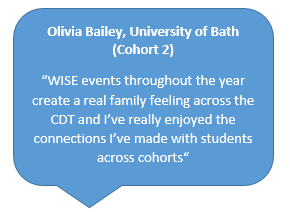Why Do A PhD at a Centre for Doctoral Training?
A CDT brings “together diverse areas of expertise to train engineers and scientists with the skills, knowledge and confidence to tackle today’s evolving issues, and future challenges. They also provide a supportive and exciting environment for students, create new working cultures, build relationships between teams in universities and forge lasting links with industry.” EPSRC
The key differences between a regular PhD and one within a Centre for Doctoral Training are:
1. Guided freedom
In order to facilitate the process of empowering both students and supervisory teams to have a successful doctoral training experience, the WISE CDT offers student-led journal paper review seminars, participation in cohort seminars/meetings and ‘meet the expert’ social events at varying partner universities.
2. Innovative training approach
A balanced portfolio of training activities, including intensive training in the first two semesters of the doctoral programme through a Postgraduate School involving both broader disciplinary and wider research methodology training.
3. Continued academic development
Students undertake a large number of activities with members of their cohort, with the aim of building long-lasting personal and professional relationships. The Transferable Skills and Engineering Leadership Programme provides an extensive and structured provision of skills training, with annual modules delivered in turn by each of the partner universities. Students are also able to pursue further specialist skills training available across the four universities through attendance at Specialist Master’s Level Modules.
4. Wide exposure
Students gain familiarisation with facilities and academic groups from across the four partner universities; available through regular seminar visits and one-day mini conferences arranged across all of the sites. Students have the option of being co-supervised by an academic from another of the partner universities which will provide a wide breadth of multidisciplinary expertise to their project.
5. Cohort development and activities
An annual week-long residential Summer School (incorporating a mini conference) is just one of many opportunities for staff and PhD students from all cohorts to share their experiences of working on water and informatics related projects.
6. Peer-support groups
To strengthen the feeling of belonging to the WISE academic community and to reduce social isolation, the WISE programme has peer-support groups (a ‘buddy scheme’), whereby all incoming first year students are assigned to a second, third or final year PhD student who has volunteered to become a ‘buddy’.





